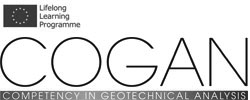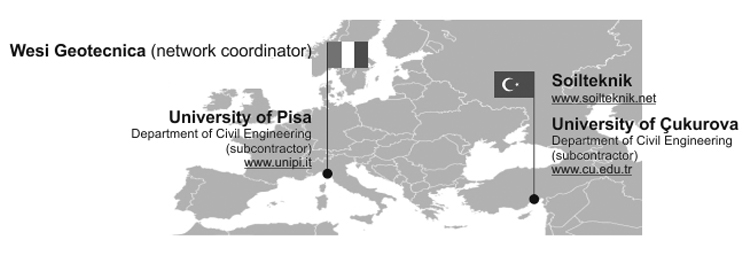Continuous improvement plays a crucial role in WeSI Geotecnica's mission. Since its foundation in 2009, WeSI Geotecnica has been contributing to research through international cooperation with research institutes and companies operating in geotechnical engineering field. The focus of such research and development projects has been advanced numerical analysis applied to geotechnical engineering problems.
 For some years there has been a need in the geotechnical industry to address the inconsistent implementation of increasingly powerful numerical analysis software (e.g. finite element analysis). Previous benchmark studies have suggested that the inconsistency is primarily a result of users of analysis software lacking the necessary competency.
For some years there has been a need in the geotechnical industry to address the inconsistent implementation of increasingly powerful numerical analysis software (e.g. finite element analysis). Previous benchmark studies have suggested that the inconsistency is primarily a result of users of analysis software lacking the necessary competency.
Therefore, the primary goal of COGAN, a Leonardo da Vinci European Transfer of Innovation project, is:
to improve competency in geotechnical numerical analysis.
How will COGAN achieve this ?
- define the minimum user competences required for the safe implementation of analysis software
- identify training resource material to help gain these competences
- provide a web-based platform to view competences and training material and to track progress
- prepare and run e-learning courses in key areas
The COGAN (Competency in Geotechnical Analysis) European project was officially launched and the first partner meeting took place in Cheshire, UK on 11-12 October.
The project will be executed by a strong EU-wide partnerships all engaged in engineering analysis in the construction sector and managed by NAFEMS. The project partners include: Geofem Ltd., TERRASOLUM S.L., Mott MacDonald, Technische Universität Graz, Skanska Sverige, EnginSoft Spa and WeSI Geotecnica.
The main outcomes from COGAN – all firsts for geotechnical analysis – will include:
- An Educational Base consisting of around 1000 Statements of Competence in about 15 topic areas. Essentially this will define many of the competences required of an engineer engaged in geotechnical numerical analysis so that training providers can develop training material to cover these competences and engineers can know which competences they need to develop their skills in geotechnical numerical analysis.
- An internet or intranet-based Competence Framework, built around the Educational Base, to allow formal recording of competence achievement, with links to wider professional/ company competence frameworks;
- Two e-Learning Modules for work-based learning, to achieve in depth the learning outcomes in two selected core competencies, and to promote the development of further modules by training providers.
The project will run until September 2015, and updates will be frequently updated on the project website.

DAS-NAG is a transnational project co-funded by Regione Toscana (Italy) and the company WeSI Geotecnica Srl within the framework of funds for regional development (FESR). The scope of the project is to demonstrate the benefit of numerical analysis when used in geotechnical analysis as support to traditional design. DAS-NAG is the acronym of Data Acquisition System and Numerical Analysis for Geotechnics. DAS-NAG’s main focus is the definition of design procedures based on measurements obtained from an instrumented field test and on the use of its measurements for calibrating and validating the numerical analysis results. The method has been validated for two important classes of geotechnical engineering problems: stability of natural slopes and stone columns as ground improvement technique.
WeSI Geotecnica has been coordinating the transnational DAS-NAG project, involving two Companies in geotechnical engineering industry and two Universities in Italy and Turkey. Full detail of DAS-NAG can be found here.

Advanced Modelling of Ground Improvement on Soft Soils (AMGISS) is a Marie Curie Research Training Network (Contract MRTN-CT-2004-512120) funded by the European Commission through the specific research and technological development programme "Structuring the European Research Area".
The Network consisted of six universities with active research programmes in the engineering behaviour of soft clays and their academic and industrial partners. The coordinator of the contract was the University of Strathclyde (United Kingdom) and the other contractors are the Graz University of Technology (Austria), the University of Stuttgart (Germany), the Helsinki University of Technology (Finland), the Norwegian University of Science and Technology (Norway), the ETH Zurich (Switzerland) and the University of Glasgow (United Kingdom).
The project started in February 1, 2005 and had been running for 48 months. Martino Leoni of WeSI Geotecnica was involved as Experienced Researcher employed as research fellow at the University of Stuttgart.